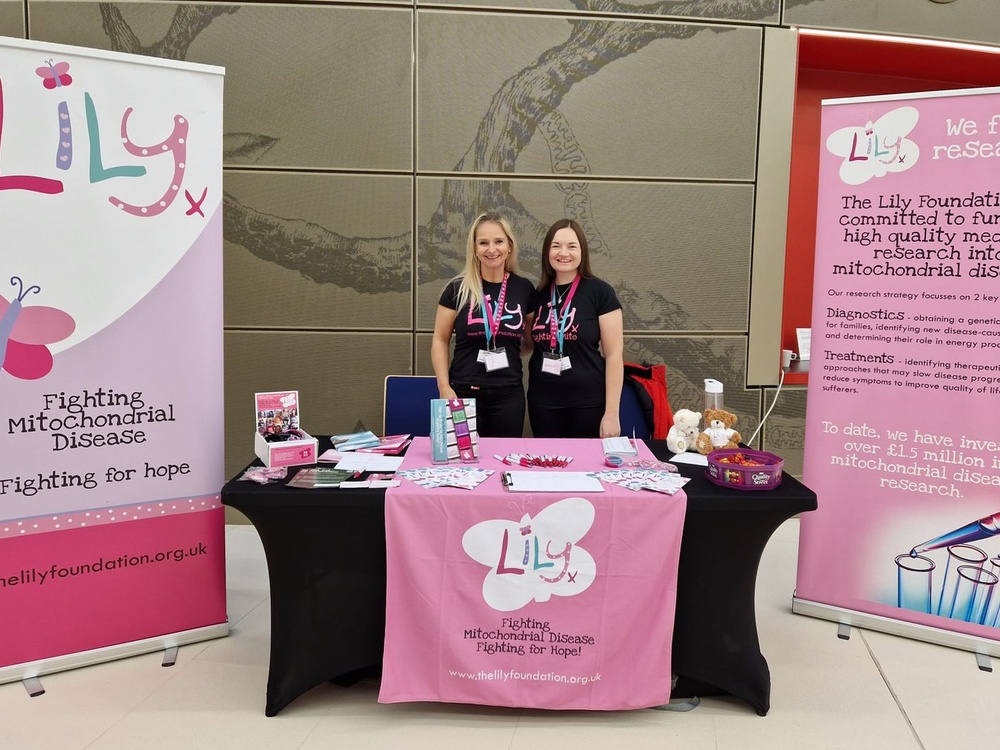Raising awareness of The Lily Foundation’s work
First up, they were delighted to give a presentation of Lily’s work at the Annual Cambridge Paediatric Mitochondrial Meeting on 3rd November, organised by Dr Pooja Harijan and Professor Rita Horváth from the Cambridge Mitochondrial Research team. This study day was well attended by paediatricians, neurologists and geneticists from the East Anglia region.
In their presentation, Alison and Katie gave an overview of the work of The Lily Foundation over the past 15 years, as well as showcasing their exciting new projects in mitochondrial disease research and the many ways in which Lily can support professionals and ensure that patients remain at the heart of their work. The day was also an excellent opportunity to hear from a range of speakers from the Cambridge team, who shared exciting details about their most recent clinical research projects.
Representing the patient voice amongst global leaders
Next up was the seventh annual Mitochondrial Medicine Conference held at the Wellcome Genome Campus between 21st and 23rd November. This conference brought together leaders in Mitochondrial Medicine from around the world, with a range of lectures focused on developing a greater understanding of mitochondrial diseases and the search for new and effective treatments. It was an excellent opportunity to meet the leading experts in the field of mitochondrial disease, build on existing partnerships and make important new connections with doctors, researchers and industry professionals.
The Lily Foundation were delighted to be the only charity exhibitor for the conference, hosting a stand for the duration of the three-day event. This provided a fantastic opportunity to share all of our exciting work with the attendees of the conference, giving out resources including leaflets about the charity, and sharing news about our latest projects. The meeting attracted international participants interested in mitochondrial diseases, working in genomics, biochemistry, pathology and clinical medicine.
Professor Rita Horváth formed part of the Scientific Programme Committee for the event. She said: "The conference provided excellent opportunities to build new partnerships and to accelerate effective treatments in mitochondrial disease and how patients can be at the heart of clinical trials.”
Educating non-specialist professionals
Later that week, on Friday 25th November, Katie was delighted to be joined by Liz Curtis, Lily’s mum and founder of The Lily Foundation, for a study day for professionals hosted by the Oxford Mitochondrial Disease service. This event, organised by Dr Victoria Nesbitt, lead consultant, with support from The Lily Foundation, was designed for non-specialist professionals and was attended by a range of staff including school nurses, hospice staff and community teams.
Here, Katie presented on the work of The Lily Foundation, with a focus on the charity’s three-point mission: to support patients and families dealing with a mitochondrial disease diagnosis, to raise awareness of mitochondrial disorders and to fund research. The day included a varied programme given by the Oxford team, with topics from genetic diagnosis of mitochondrial diseases and an outline of what patients should expect from Mitochondrial Clinic, to clinical aspects such as educational support, physical therapy and diet and nutrition in mitochondrial diseases.
Connecting with industry
Finally, at the end of the month, Alison was joined by Christine Beale from My Mito Mission and Professor Antonella Spinazzola from London UCL to represent mitochondrial disease at the Aspire Biosciences partnering event. This event was a unique opportunity for selected charities to meet with companies who have a commercial interest in rare disease and who have technology assets which could be used to advance our goal to find treatments and a cure for mitochondrial disease.
Speaking about the event, Alison commented: "It was so exciting to be able to identify areas of research that overlap with existing drug therapies and we are hopeful that these synergies will develop into established research collaborations and will accelerate the path to discovering effective treatments and cures for mitochondrial disorders.”
Lily-funded research projects have already resulted in faster, less invasive patient diagnosis, and have helped families affected by mitochondrial disease to have healthy babies. You can find out more about all the research The Lily Foundation is involved in here.

